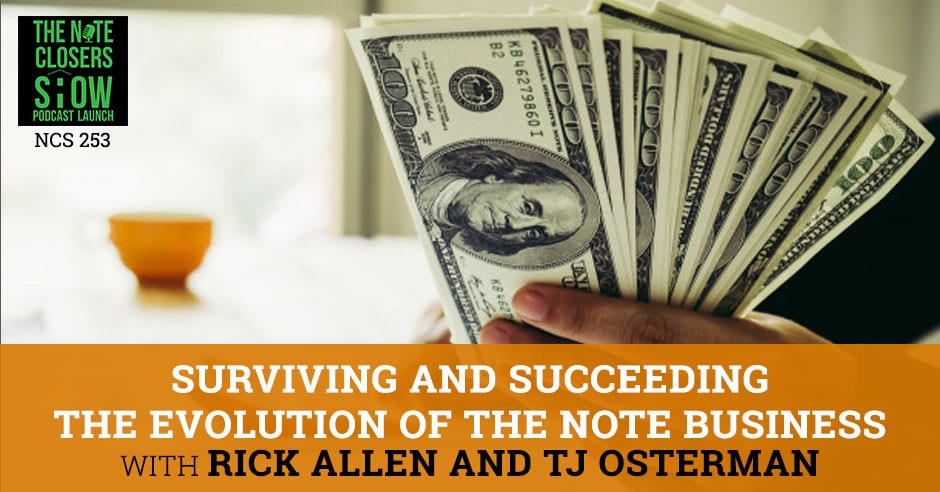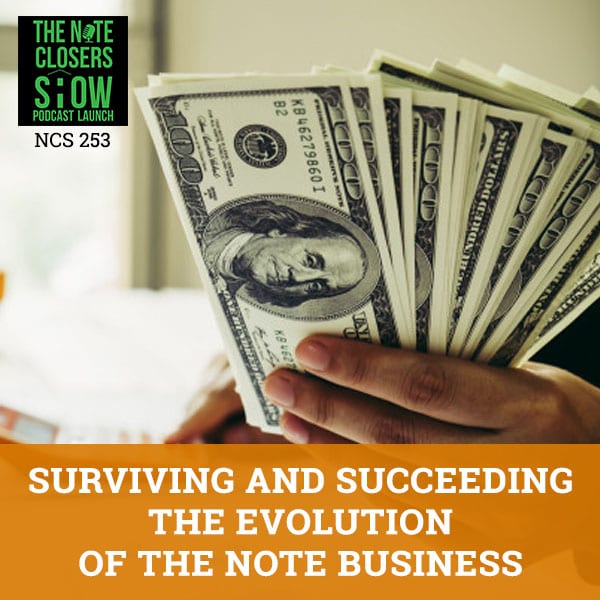
When starting your own company, you can put in low capital and still be profitable the whole time. Rick Allen and TJ Osterman from Paperstac share how educating yourself and knowing everything you can about the business will steer you away from trouble and get you on the right path. Their business has evolved from fix and flips to notes to owning property and now investing. By being a lending institution, they now make money out of putting out money and getting income that way. Their secret to success is all about navigating through the evolution of the note business and the real estate world and building and valuing relationships which lead to many years of business.
—
We have Rick Allen and the TJ Osterman from Paperstac.com to join us for this episode. They do a really great job sharing how their business has evolved from the fix and flip and how they originally got in the notes looking for actual property and how that has changed from being property owners to be in the bank. Not only are they great investors, they’re also got a big heart to really help a lot of families out there to keep people in their homes along with some great returns, not only for themselves, but also the investor. I highly encourage you to check out their website, Paperstac.com.
Listen to the podcast here
Surviving And Succeeding The Evolution Of The Note Business with Rick Allen and TJ Osterman
I’m excited to be joined by the two guys from Paperstac. How are you guys doing?
How are you doing?
Why don’t you share with our Note Nation a little about who you guys are and how you got started.
I’m Rick Allen. I’m originally from Columbus, Ohio. I moved to Orlando when I was eight, so I’m a natural Floridian. I got into real estate in 2005 and started doing a wholesale thing. I met you in 2008 or 2009 at a wholesaling event that you were doing. TJ and I met there 2005 and worked for a nationwide wholesale company sourcing properties and also sourcing some hard money. In 2008, when the market was tanking, we decide to open up our own company, which we were fortunate enough to be profitable the whole time and sold that out in 2011 and sort of stumbled into and stepped in a big steaming pile of notes in 2012. We haven’t looked back since. We went in full-time and really educated ourselves. We put together a low capital. We manage about $6 million right now in capital and we’re in the process of doing our first fund to the SEC, a regulation fund where we can do $50 million every 12 months. It’s been a long journey. We’ve been excited. We also have a company called Paperstac, which is an online note trading platform. A lot has happened in a short amount of time.
I’m TJ Osterman from Chicago, Illinois originally. Been down here about eighteen years, I think. Timelines are skewed on me, I’m not very good at them. Originally moved down here to be a teaching pro at golf, quickly flipped my first house and realized, “I certainly don’t want to work in the golf industry.” I enjoy real estate. It was a great time back then to do real estate and it got me hooked. I enjoy swinging the hammers to source some private money for people to wholesaling stuff out. What we were doing was a lot of low income housing, so we really got to know that industry a little bit. When we went into the note business ended, the low-income notes, it was an easy transition for us. I’m a father. I have two kids, Reagan who’s four years old and Dylan who’s four months old. My life has been really interesting since then. I’ve been married to my wife for two years and we’ve been together about six. We got into the note business and didn’t look back. It really changed our whole outlook on things. We saw whole new opportunities open up.

Evolution of the Note Business: You’ve got to look and see what that thing is worth and to be able to understand and not be afraid.
The great thing about it was we didn’t have to pivot it too far from the disciplines we learned in real estate, which was great because there is a lot more stuff to learn, but it really comes down to the core. You have to understand the value of what you’re looking at and these are collateralized by property. You got to look and see what that thing is worth and to be able to understand and not be afraid. Our risk tolerance was a lot more than I would say the average person, so we were lucky in that aspect. We’re ready to keep growing and we see a really big opportunity here as possibly speculating as is a downturn. When it does happen in the market, because it’s cyclical, we all know what’s going to happen, you want to be in a good position to take of something because its ups and its downs. This industry can make money in all markets. We’re excited and thank you for having us. We love your organization.
There’s two things that really help transitions. If you’re a good wholesaler and also you’ve got a mortgage background, not eliminate anybody else, but what I’m saying is that’s the whole kind of gun slinging attitude if you’re a wholesaler. You get the fact, “I’m going to put something on the contract and go find a buyer. I’m going to put a note under contract and go find a funding source for it because the deal make sense. Wholesaling is not bad. I think a lot of people leave a lot of money on the table, especially in the note industry. Do you agree to that?
A lot of times, people get in there and they start looking maybe for that diamond in the rough like, “No, can’t do anything with it.”I’m like, “You might not be able to, but there’s somebody right there who is like, “I don’t know what to do with the note. I love notes. I can’t find houses. I’ll buy the note if you can help me out, show me what to do.”
It was funny because when we were all buying in wholesale and notes, the REO agent was like the Messiah. We were like, “We have to get in and know all these REO agents.” What it came down to was the bank had all this control over all these assets and we were thinking, “If we follow the money, we can become the bank.”
It’s all about the finance. We are going for the REO agents. You go for the level above the agents, the asset managers. You can go to the asset managers, it’s the same thing. Instead of buying the real estate, now you’re trying to buy the debt.
If you were talking about leaving a lot of money on the table, are you speaking specifically about sometimes note investors will tee something and it’s scratching dents and they’d shy away from it?
I’m talking about wholesalers that will just flip stuff for like a flat fee. Those guys that will say, “Give me three points or giving me $500, $1000.” They’re too scared to approach the people that they’re selling those notes to make that transition mentally like, “Instead of me selling this to you, I want you to fund this deal. I’m going to run with it. You’re still going to make a great return on investment if we go JV partners or flat return. Let’s do that.”I see a lot of wholesalers who are people that are afraid to pull the trigger. There’s plenty of those “gurus” saying, “You can wholesale. Let’s drop 5,000 postcards in the mail.”You’ve done it. I’ve done that in the past. That’s not smart investing in these days. Do you agree to that?
No, it’s definitely not a smart investment because that pays you one time. That’s how we started. We had a little bit of our own capital. Our first note was a frame duplex here in Orlando. It was $90,000 debt. We paid $8,400 for it. After we did three or four deals, we went and showed somebody and said, “This is what we’re doing.” They go, “I’ll give you $1million.” We’re on a 50/50 split, and it’s like, “$1 million, okay.”
It’s almost like when I was selling timeshare, a lot of the people that performed well in timeshared. They asked for the close, they asked for the money, they asked for what they want. You can’t be afraid because you’re actually doing a disservice to that investor, to that other person on the other end. Say, “This is what we’re doing and I’m not planning on going away tomorrow. I am building this business. I’m trying to do a lot more deals in the future and I’d love for you to come on the journey with me.”You’re doing them a service sometimes by asking. That’s the lens you got to look at it.
You got to look at and say, “Not that you’re being a burden.” You look at it through, “I’m giving this guy a great opportunity and far be it for me not to give him that opportunity. I should give him at least a chance to say “no, and you get a lot of yeses. When you charge a flat rate like that, you’re not conveying a confidence in what you’re doing. It’s just like, “We’re going to do this and do that, but it’s not a confidence builder.”
It’s not the confidence you get from actually diving in to a deal and realizing, “Here’s the strong points of it. It’s actually worth this,” or “The homeowners looking for two years, and the rent rate is $1,200 and their existing payment, $700 because it’s prime for a good mod.” When you know the details, you come from a much bigger confidence level and that portrayed when you’re talking to your money partners. Because us coming from the fix and flip side and the wholesale side, one point you couldn’t throw a rock without hitting three REO agents. They’re rare and they’re also, “I’m an REO agent. I’m an air. I’m still an REO agent. I don’t need to do anything.” That’s fine, but there’s still a lot of hungry people out there looking for deals.
They’re not doing anything. It’s a self-fulfilling prophecy. They can get what they want.
What’s been your main focus? I know that it’s evolved over time, but what’s your focus, your bread and butter assets that you’re looking at and what’s your game plan for your note business?
When we jumped into it, it was 2012.People are paying over par at the auction and we got into it as a cheaper way to buy houses. We’re like, “Let’s get to the real estate. That’s so easy.” Once we get the real estate back, we know what to do. We started talking to the borrowers and people were like, “I don’t want to give you my house. I don’t want to sign a deed in lieu. I’m going to fight you in foreclosure.” We’re like, “Let’s talk about modifying their loan or give them a short payoff.” We evolved into, “I don’t want the house back now. We don’t want the real estate.” We’re all about saving people’s houses and all about generating that cash flow, and the end of the day or marketing line for our fund is you connecting money with meaning. If you can go out there and you can make a really solid double digit return and keep people in their house, it speaks directly to his mission thesis and where he’s going, where we’re going together. It’s huge.
Whether you care about doing good or not, the bottom line is the secondary market right now, if you have an RPL, it’s trading at a higher level than an NPL. Why wouldn’t you reach out to the borrower if you’re getting it at a discount and saying, “I don’t want to have to take this through foreclosure.” I looked at our portfolio, there’s hundred plus assets and what we would cash burn a month on houses in the Midwest. You have to securitize them, winterize them.

Evolution of the Note Business: Whatever your intentions are, ours is obviously that impact intention to help save 10,000 families’ homes in the next five years.
If you get somebody in there or even a vacant owner, you reach out to them and say, “Do you want to keep the home, keep it as a rental or whatever it may be, so we don’t have to go through that process?”The secondary market RABs are very yield hungry, self-directed market. There’s $14 trillion sitting in the self-directed IRA 401(k) market with a bunch of stock market. They call them the stock market refugees sitting out there. They’re very yield hungry and RPOs are the perfect fit for them. You could sell some of your payment, whether it be 360 months and you sell120 months to meet their yield. Whatever it is, the strategy that a note will allow you to do is awesome, especially a performing note. Whatever your intentions are, ours is obviously that impact intention to help save 10,000 families’ homes in the next five years. We’re going to be putting out a product on the back end, not only saving, that’s going to be awesome for those yield hungry investors that you put it with the servicer and debt service is collected by them at that mailbox money.
Once we started to get some RPOs and holding them into our portfolio, that helped cash flow every month. From going in straight MPL to try and take the real estate back. We were like, “You can only scale that unless you’ve got an unlimited amount of money.” You have to start getting some cash flow in. Pepper it in your portfolio with some RPLs, maybe partner up with a JV partner. Both of you own half of that. If you’re getting $400 a month in a note, split it up to $200. There’s so many cool ways to do it. It’s really exciting for us. We’re ready to do a new fund where we’re able to raise up to $50 million a year. It’s a regulation a-plus bond, and we’re going to be hopefully bring some institutional style money to huge gaps in the low-income market and spending.
We target a house that’s a $150,000 or less in value.
If you’re targeting greater than $150,000 homes, there’s nothing wrong with that. They’re just not going to mod at a high enough rate for you. Your best player is to foreclose and it’s going to drag it with the foreclosure timeframe, so stick in the sub hundred and sub $25,000 category because that’s where 90% of the inventory is at anyway. You look at what your monthly nut is to cover or to help you retire from your job, focus on getting stuff that you can get re-performed with cashflow. It’s mailbox money. It takes the edge off of having to go, “I got to make so much each month to cover my bills,” when you know it should be coming in on a regular basis.
I was looking at a mod and going over with our asset manager and was like, “We’re the dead on. It’s like 71 total payoffs. 95 houses worth 60.” She was like, “We need to mod this person.” I was like, “Let me look at this. We’re into it for 13. Where can we put the mod?” No matter where you put it, you’re going to be 20% or higher. It’s so nice to do that and it’s always fun. I don’t do it often, but what if it pays all 30 years out and look at that number. You’re like, “It’s astronomical.”
But it’s still cheaper than rent. 99.9%, I can say to that borrower, “No matter what we do here, you’re going to have to go somewhere.”
Market rent is $800 a month. Where are they going to go? It’s like, “I’ll put you at $450, half of market rent.” We’re killing it. They’re happy. And especially, with the major issues with lack of affordable housing. There’s no funding because they’ve just done the corporate tax where they lowered it from 35% to 21%. All these corporations that were buying the low-income housing tax credits that were funding the developers to build low income housing tax aren’t funding it. They don’t need it. They got the great 14% discount on their tax. To talk to the problem with lack of affordable housing, note investors out there in the small stuff space that we’re in. You’re doing a great service and I applaud every one of you that are able to keep somebody in there. These people are getting thrown out of their homes and there’s no rent available. It’s a hard deal out there right now.
That’s the great thing about it. Not only save a family, help to give them a little bit of hope, but you’re also saving the neighborhoods because you’re avoiding the foreclosure sales, avoiding that vacant house sitting there and depreciating and then bringing the property values down across the border. In 2009, I had some rehabs that went from being valued at $300,000 to $180,000 because the foreclosure is taking place on the block. We’ve been through this upswing. Where do you guys see the market going?
The market here is super strong. It’s definitely still taking up. It may be leveling off just a little bit. I still think there’s areas in Midwest, in the middle of the country, where there’s still some room for some growth. It seems like the affordable housing is definitely the issue in there, so if you can buy houses in that area, you are buying debt in that area, you’re buying it still for fairly cheap. You can beat the whole rental system because it’s tough to get in there, especially in Orlando. It’s really hard to go out and say, “I’m going, go buy a rental property and get in there and make those huge cap rates.” It’s tough. To get into the Midwest, you can still do that in there if you’re buying the debt.
Market wise, it’s cycles every ten, fifteen, twenty years. Some people are saying 2018, you’ll start to see some signs of different things happening and I think we are seeing certain things happening right now, whether it’s going to be a total bubble burst or crash. At the extent that we did see, no, because the audits that have been going on where the assets going into the asset back securities are now standardized.
I don’t think we’ll ever see that dip like that for the reasons that happened. I did see that the risky loans are coming back. Seeing that in the news. I was like, “This is familiar.”
I was reading an article about the attorneys and how they’re having to standardize and auditing practice of the mortgages that they’re actually looking at. It will never be where they’ll go back into an asset backed security and look at all the loans in that portfolio and said, “There’s fifteen of these.” I’m seeing a turn sooner than later. That’s what I’m speculating. I would say within the next year, two years, I think a downturn is going to start to happen. If you’re in the note industry and you’re in a smaller balanced stuff, position yourself now because banks are very big on image. It’s their shareholders and investors not wanting them to have distressed debt and that’s why a lot of them will hide it and put it into these bad banks. The bad bank just distributes the bad debt into these bad bank holding companies and that’s what happens. You’re going to think to start to see an uptake when values level out on the real estate and you’re starting to see the arms that they’re trying to get rid of.
The trade agreement. It all depends. We see the price and new housing uptick. You’re going to see a little bit of a leveling off there as they keep raising the rates. That certainly is going to affect the value on stuff people can’t afford as much.
I’m a big believer that it all depends on where the finance industry goes because there’s a lot of cash sitting out there flushed. Hard money lenders are scrambling over each other trying to get their money in the market because there’s so of it available. We’re starting to see that subprime lender started to jump up again. Seventeen states have programs with different lenders that will do 0% down payments, a 100% financing or they’ll do the FHA financing, but the bank will donate but two and a half, three and a half down payment and that is a recipe for disaster.
We’re already seeing signs pop up on the outskirts of Austin or lower priced markets. Zero down, $500 down and I’m like, “What the hell?” Somebody was talking on Facebook, “I got so many mortgages. 95%finance with a 565.” I’m like, “That person’s not supposed to have a mortgage.” You have maybe a 49 new build now, but the first year when those taxes change, they’re going to be in default again.

Evolution of the Note Business: When you’re a bank or lending institution, you make money out of putting out money and getting fee income that way.
It’s the pressure when you’re a bank or lending institution, you make money out of putting out money and getting fee income that way. It’s the pressure from all the other institutions, so they’re all working together to continue to have to put riskier investments and to keep them at the top. They have to look as though they are doing business here. It should be the opposite way. When it actually starts to become a really good market, it should be harder to actually get a loan, but it’s the opposite in the world, so we’re backwards.
You need to look at something. It always can’t be just looking at a number and saying, “Let’s dive deeper,” and say, “Does this loan actually makes sense?” When we get the common-sense underwriting, then that’s when I think you get good quality loans and you get loans that I look at and say, “I’d like to buy that loan.”
Whenever you come to an institutional level, you always have headlines. These guys are wanting to headline, like Citadel is one of the companies that’s doing sub-prime stuff. They’re in DS News, that’s headline. For investors in their bank, they like to see they’re doing this good stuff. When stuff starts going bad, which will if you’re offering these people stuff that they’re not able to afford, it’s quickly pushed under the rug and there opens the huge gap for the opportunity for good talent to come in and help these distressed borrowers out. They’re not going to allocate the resources to helping these people because once again they had have to show that to their investors. They’re going to say, “Why are you putting on a lot of resources into distressed loan sales and hiring top notch professionals?” Distressed loans are entrepreneurial, banks are not.
They did that already. They tried that play of hiring people to come in and handle the distress loans that they eventually just packaged them up and sold them all.
The only company that’s really going to have any success would be like Goldman Sachs who bought 26,000 mortgages without the intent to do loan mods to reduce their billion-dollar fine they got from the government. This is why they’re willing to overpay for those mortgages. It’s sold off, so they bought those. They overpaid for them, but they have cheap capital and they’re getting a tax discount. They don’t really need to make profits on it, but I still think that leads a lot of opportunity for the mid guy, the crumbs guy to the war dog guys, the note dog guys going out there and carving up stuff or getting a piece of the pie. Are you buying mostly one off or mini bulk stuff?
We’re buying stuff and piecing it together in a one-off situation and we’re buying many bulk stuff. Not super high million maybe is the highest. That will probably all change once the fund is up. When you have those more zeros in there, you can just start talking to different people.
Most of our trades are sub million bucks, and that may be 30, 40, 60 contract for deeds or 30, 40 non-performing notes. That’s either from a fund or we had a couple of students that funded the million-dollar purchase, but it was a bank portfolio. The bank wants to get rid of that one lending platform with their subprime borrowers and didn’t want to be the bad guy, so they had to sell it off to somebody. Let them be the bearer of bad news and they can say the positive. It’s more about the bulk guy. It’s more about the mini bulk, not such a huge trade. You get $25 million and you’ve got to put that money to work. Otherwise, it’s burning a big hole in your pocket with the interest rate and the fees off there.
You want to get money in and you want to get money right back to work because money’s sitting there idle is dead money and that’s no good.
You have a platform. You love buying and re-performing, but those that aren’t going to re-perform and it’s like you want to get that money back out and back into buying more stuff. Is that correct?
We definitely want to get the money. We don’t want to take the house back. We want to get in there and we’ll let somebody else do that, so we’ll definitely utilize our platform to that, but we also use that to put out an end product of a re-performing loan. It’s been seasoned up. On Paperstac, we’ve had the one-off buyer who’s a self-directed IRA guy, sold a lot of them on debt. We’ve also had some institutional buyers who come in there and pick out like, “I like the way these seven of them look, let me package them up and move.”
These regional guys or even community banks may say they are buying re-performing loans. When people think they’re dealing with institutions, they think they’re dealing with like Wells Fargo right away. They’re looking for cashflow too because they have investors. Why they don’t like the show bad loans on their balance sheets are the same reason why they like to show cashflow on their balance sheets. There are so many opportunities and there are about 25,000 banks. That is insane. We deal with one bank, for instance, they are a little bit slower because they are institutional on their due diligence, if you can turn on that outlet, they’re willing to buy that RPL also.
There’s been asset managers I bought non-performing from and then I sold them re-performing loans back. They were looking for a ten yield, a twelve yield on that because they’ve got cheaper money. They need that to come in and need that type of double digit or close to double digit return to them. That’s the beautiful thing about the note industry. People are buying from each other and selling to each other because everybody has a little bit different makeup of their business or their markets or the cities that they’re investing in.
We did a trade like that where we sold off half a million and bought about half a million on somebody and it was the same person. It was stretched out over a 25, 30-day mark, but it was like, “We’re looking for something like this.” I’m like, “That looks good.” I almost think that’s where the word ‘trade’ comes from. It’s like you’re just trading back and forth.
For the audience, if you sell somebody in RPL and tell them on the back end, “If you need to liquidity clause or you need your money out, I’m willing to buy that. If it goes NPL, it’s going to be at a discount, but I can get you out of your position and I’d be willing to take it,” and then get that thing RPL again and say, “When I get this thing performing again or whatever we do to structure it, you want that product.” That’s the cool thing is being so creative with this stuff and those relationships are just not that thing being it’s like, “Let’s work these together. We understand you like RPLs. We’ll buy whatever.”
That kind of relationship is important. Like in the wholesale game, if you burn an REO agent, you were cooked, and you’re done. This is a really small, tight knit industry. You’re going to make a relationship with somebody. You want to keep it good. You don’t want to get blacklisted because you’re telling somebody, “I’m going to close, and you don’t close.” You see these people at the expos or different events. You see them there. It’s not like there’s no face with these names. You see these people all the time. That’s one thing I would definitely let people know is, “If you start a relationship with somebody, value the relationship. If you’re going to go somewhere because it can lead to many years of business.”

Evolution of the Note Business: If you start a relationship with somebody, value the relationship because it can lead to many years of business.
Going back to the Paperstac, we have to open up conversations about this asset class. If we want to build this market with Paperstac, it’s a lot easier way to look at asset. It’s a great way to communicate with buyers and sellers. We’ve been doing this six years in the trenches and it’s borne out of us going, “What did we just do? We just send $250,000 to somebody. We have no idea.” We can’t track no through the snail mail and through the email to try to find all the noise through the emails. My email has like 15,000 emails and I’m trying to find a communication I had with the seller. I’m sweating and not sleeping at night. You got to put it all in one place and that’s why we love Paperstac. There’s a lot of potential with bringing in more of a standardized approach, more of a linear type of progression.
It’s a to-do list. We launched in September and we’ve already done a full rewrite on it and it’ll be coming out next month. We took the advice and the feedback we got was like, “Let’s just make the to-do list. It’s so easy.”For the person that’s never bought a loan, you can get on there and jump into a transaction and say, “What do I do next?” You don’t even need to worry about it. You’re on a conveyor belt. It’ll say, “This got a green light. You need to go do this.”
We have a five-year time horizon on this new fund, which we can raise up to $50 million every year and we’re going to put all that money to work. We’re going to have a lot of assets being put out through Paperstac to one-off investors, people that are willing to RPLs to NPLs to working with people on whatever it may be. Stay in touch and will definitely help because it was born out of us six years in the trenches and still in the trenches, the worries, and the like “Why is it so difficult sometimes?” Doesn’t need to be with the technology. We were talking how technology has leveraged all of us to do stuff that corporations just fifteen years ago were only available, allowed to do. The jobs act has allowed us to do a lot more now. It’s going to be that time of the smaller investor. Smaller investors are like hundreds of millions of dollars when you’re talking about and that’s enough for me. About $13 trillion in self-directed market. We’re really excited about everything and anybody that’s in it, let’s have some fun.
There are a lot of opportunities in the market whether it’s up or down. You just got to figure out what your niche is. You got to learn. You’ve got a network more than anything else with people and not be afraid to ask questions but also if you decide you’re going to pull the trigger, make sure you communicate. Talk with a buyer.
Same way with the borrowers that we talk to. “If you feel, fifteen days into the mortgage, that you’re going to be late, something happens, worst case is to go dark.” We’re not going to come at you with like tigers and rip your face off. Communicate. Can you afford to give us a couple of hundred dollars right now and will continuously talk about it? There’s the bad actors, but most people really want to do the good thing and they want to feel like they’re paying bills. It sucks when you don’t pay them. Believe me, it’s worse. I’ve been on that end. Same thing with people that are buying notes. You got to be able to perform. If not, just reached out. There’s plenty of JVs out there to say, “I’ll pick you up from this end.”
Or get an extension on the timeline. We do it all the time but reach out. If you need fifteen extra days, I can get you fifteen extra days if you call. If you don’t call, I can’t do anything.
I think this is something we enjoy every day. Every day is different. You would agree with everything is the same, but everything is different. You never know what you’re going to walk through on a daily basis with the borrowers, the stories and relationships. You never know who you’re going to talk to you. You never know who you’re going to see. You never know who’s following you or on your mail list. One of the biggest things I love is every month we send an email out to our asset manager list and every month we get an email from somebody. I have no idea who they are. I’ve never talked to before. When I go back into my infusion soft, I’ve seen that they’ve been on my list for three, four years, and they’ve got something.
You teach your students very well on how to run the drip file, maybe continuously stay in there and don’t push it up on because one day, one them going to win the Powerball and the next thing you know, “From hanging out with me and showing me some good stuff, I’m willing to put $15 million to work.” You never know what you get.
What’s the best way for everyone to get a hold of you guys? Go to Paperstac.com. Is that the best website to go in and opt in?
You can go to Paperstac.com and reach out to us there. You’ll be able to talk directly to somebody in the shop.
You can go to our main site, which is CloudCapitalManagement.com. You can follow what we’re doing with the fund from there because there’ll be a link directly to the fund. This is going to be one of many funds that we’re going to be doing. Reach out to us. My email is TJ@Paperstac.com.
If you want mine, it’s Rick@Paperstac.com.
Thanks so much for taking time out of your busy schedule to join us. We look forward to talking with you in the future.
Important Links
About Rick Allen
 For over 10 years Rick Allen has been an active investor. As the Co-Founder and fund manager of Cloud Capital Management and the Co- Founder of Paperstac, he has conducted transactions with large A-list institutions. Rick has expert experience in investment strategies of the real estate sector, with a primary focus on discounted Acquisitions and distressed assets. He has participated in the purchase of over 400 single family homes with a purchase price of $25,000,000.00 and a market value of $45,000,000.00. When presented the opportunity to purchase a mortgage note 3 years ago, Rick jumped at the opportunity and has not looked back. The past 4 years have been spent raising capital and managing a multi-million dollar portfolio that focuses on socially responsible investing. With capital efficiency and preservation at his core, Rick infuses data analysis and technology into his business acumen to foster efficient and secure capital deployment into successful investments. “When you can help a family stay in their home while showing very high returns for investors, you create win-win scenarios that feed the soul.” He has gained experience through mentorship from an industry giant, that has traded more than 30,000 notes and been in the industry for over 25 years. Moving forward, his focus is to bring transparency and liquidity to the Investment Mortgage market by allowing private investors to gain access and participate in a safe and lucrative investment vehicle. As a husband and a father of three, Rick enjoys spending his free time with his family. Whenever possible, he will certainly sneak out to play 18 holes of golf.
For over 10 years Rick Allen has been an active investor. As the Co-Founder and fund manager of Cloud Capital Management and the Co- Founder of Paperstac, he has conducted transactions with large A-list institutions. Rick has expert experience in investment strategies of the real estate sector, with a primary focus on discounted Acquisitions and distressed assets. He has participated in the purchase of over 400 single family homes with a purchase price of $25,000,000.00 and a market value of $45,000,000.00. When presented the opportunity to purchase a mortgage note 3 years ago, Rick jumped at the opportunity and has not looked back. The past 4 years have been spent raising capital and managing a multi-million dollar portfolio that focuses on socially responsible investing. With capital efficiency and preservation at his core, Rick infuses data analysis and technology into his business acumen to foster efficient and secure capital deployment into successful investments. “When you can help a family stay in their home while showing very high returns for investors, you create win-win scenarios that feed the soul.” He has gained experience through mentorship from an industry giant, that has traded more than 30,000 notes and been in the industry for over 25 years. Moving forward, his focus is to bring transparency and liquidity to the Investment Mortgage market by allowing private investors to gain access and participate in a safe and lucrative investment vehicle. As a husband and a father of three, Rick enjoys spending his free time with his family. Whenever possible, he will certainly sneak out to play 18 holes of golf.
About TJ Osterman
 TJ Osterman is a Husband, Father, Entrepreneur, and is interested in positively impacting society anyway he can. His current project consists of helping the underserved, the low to middle income families in this country. “We have become complacent, relying on the cyclical cycles of our economy and country, not innovating and taking chances, this needs to change and we want to help champion this by using low to middle income housing as the tip of the spear into this risk we face as a country. The risk of completely losing the entrepreneurial spirit of the lower to middle class. If we want to incubate a society that is entrepreneurial and innovative we must first make sure they have security and safety. We need the low to middle class and the ideas they have. This comes back to Maslow’s hierarchy of needs, safety, security, their homes, places to live. There are obviously global situations far worse and grave however we must also look at local social situation going on at home.” Tj and his company Cloud Capital Management do this by buying small balance distressed mortgage notes and using market based systems not theory based systems to help get these families back on track. He is looking at increasing social mobility on this plan by putting together a REG A+ offering by end of 2017′. “Bringing a fully digital process to this space was needed and we thought we could provide it with the development of Paperstac” Check it out.
TJ Osterman is a Husband, Father, Entrepreneur, and is interested in positively impacting society anyway he can. His current project consists of helping the underserved, the low to middle income families in this country. “We have become complacent, relying on the cyclical cycles of our economy and country, not innovating and taking chances, this needs to change and we want to help champion this by using low to middle income housing as the tip of the spear into this risk we face as a country. The risk of completely losing the entrepreneurial spirit of the lower to middle class. If we want to incubate a society that is entrepreneurial and innovative we must first make sure they have security and safety. We need the low to middle class and the ideas they have. This comes back to Maslow’s hierarchy of needs, safety, security, their homes, places to live. There are obviously global situations far worse and grave however we must also look at local social situation going on at home.” Tj and his company Cloud Capital Management do this by buying small balance distressed mortgage notes and using market based systems not theory based systems to help get these families back on track. He is looking at increasing social mobility on this plan by putting together a REG A+ offering by end of 2017′. “Bringing a fully digital process to this space was needed and we thought we could provide it with the development of Paperstac” Check it out.

